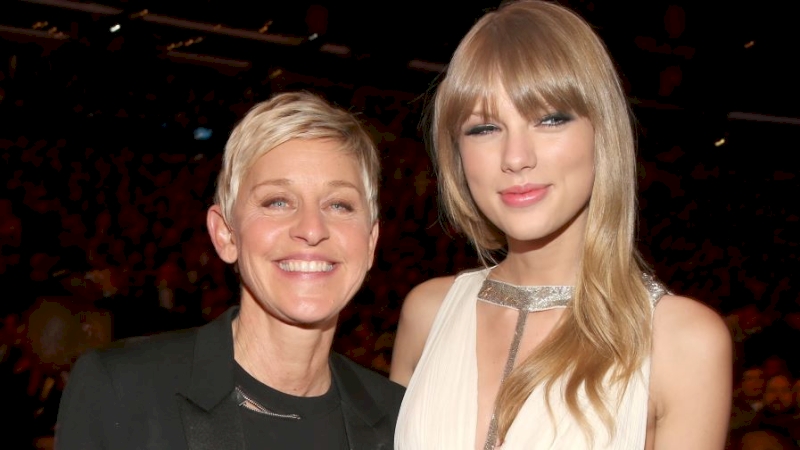In a recently resurfaced clip from “The Ellen DeGeneres Show,” a 2012 interview with Taylor Swift has drawn widespread criticism from fans and viewers, who describe Ellen’s behavior as bordering on bullying. The segment shows Swift visibly uncomfortable as DeGeneres relentlessly teases her about her rumored relationships, even after Swift repeatedly asked for the conversation to move away from the topic.
During the interview, Ellen pressured Swift into playing a game that involved guessing which celebrity she had dated, despite Swift’s clear discomfort and insistence that the rumors were not true. Swift said, “You’re making me feel so bad about myself right now,” to which Ellen responded by laughing it off, pushing Swift further to participate in the game.
This moment is not isolated; it’s just one of many instances where Taylor Swift has had to deal with media and public scrutiny over her dating life. Throughout much of her career, Swift has been subjected to extensive commentary and speculation regarding her relationships, often in a way that many argue is gendered and unfair. The focus on her personal life has sometimes overshadowed her achievements as a musician and songwriter.

The backlash against Ellen DeGeneres for this interview segment ties into a broader conversation about how women in the entertainment industry are often treated. Swift has been vocal about the impact of this kind of scrutiny on her mental health and has used her platform to challenge the double standards faced by women in media. In her documentary “Miss Americana,” she discusses how difficult it has been to maintain a public image while constantly being criticized or mocked for her choices, especially when it comes to her relationships.
This interview clip is also being revisited in light of past allegations against Ellen DeGeneres and her show’s environment. In 2020, Ellen faced significant backlash when former employees came forward with accusations of a toxic workplace culture behind the scenes.
Accusations ranged from mistreatment by senior staff to a general atmosphere of fear and intimidation. While Ellen addressed these concerns on her show, apologizing and promising change, the incident tarnished her reputation as the “queen of nice.”
The combination of these factors has led many people to re-evaluate Ellen’s on-screen persona. Moments like the one with Taylor Swift are now being seen in a new light, with critics pointing out that her seemingly playful teasing sometimes crossed the line into mean-spirited territory. The clip has also prompted commentary from notable figures, including model Emily Ratajkowski, who expressed her disappointment in Ellen’s treatment of Swift, calling it inappropriate.
For Taylor Swift, this interview is a reminder of the challenges she faced earlier in her career when her personal life was often used as a punchline. Since then, Swift has taken more control over her narrative, particularly through her music and social media presence. She has grown more outspoken about the ways she’s been treated by the media, highlighting issues of sexism and the undue focus on her private life rather than her professional achievements.
Swift’s evolution as an artist and public figure has been remarkable. From her early days as a country music sensation to her transition into pop and alternative genres, she has proven to be one of the most versatile and influential artists of her generation. Her songwriting, which often reflects her personal experiences, has resonated with millions of fans worldwide. Yet, the media’s fascination with her romantic life has sometimes detracted from the focus on her artistic contributions.
Despite the challenges, Taylor Swift has turned these experiences into powerful statements in her music. Albums like “1989,” “Reputation,” and “Lover” reflect her journey of self-discovery and resilience in the face of criticism. Her song “Blank Space,” for example, is a satirical take on how the media portrays her as a serial dater, cleverly turning the narrative on its head by playing into the stereotypes that have been thrust upon her.
The resurfacing of the Ellen interview highlights the importance of respecting artists’ boundaries, especially when discussing sensitive topics. The scrutiny Swift faced is part of a larger issue where women’s worth is often tied to their relationships rather than their accomplishments. Swift’s handling of these situations, both then and now, is a testament to her growth and strength as an individual and an artist.
Ellen DeGeneres, once celebrated for her charm and humor, has faced growing criticism for moments that some view as overstepping the bounds of good taste. The shift in public perception towards Ellen’s approach to interviewing could signal a broader change in how audiences expect celebrities to be treated on talk shows. Respectful dialogue and empathy are becoming increasingly valued in these public interactions.
As society continues to call out problematic behavior, especially in media and entertainment, moments like these serve as a reminder of the importance of empathy and respect in all interactions. While Ellen’s intentions may have been to create lighthearted entertainment, the impact on Swift was far from humorous. It’s crucial that public figures like Swift are acknowledged for their talents and achievements, not just scrutinized for their personal lives.





